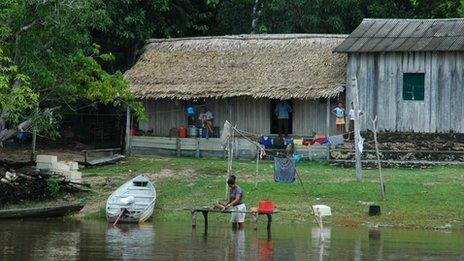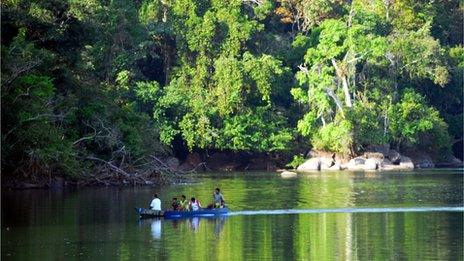Poor Amazon farming community scores land victory
- Published
Four members of farming families on what their land means to them
After more than a century of struggle, poor Brazilian farming families along the Tapajos river, a tributary of the Amazon, have won rights to their land, reports Sue Branford from Para state.
Their victory is being hailed as a remarkable recognition by the authorities of the rights of a traditional community over the interests of powerful economic groups.
The move is surprising because it runs counter to the government's plan to build a series of hydroelectric dams on the river, which would flood the land now granted to the families.
The decision creates a real dilemma for the government.
If it is to press ahead with the dams, it will now have to relocate these families to a comparable location, which it cannot do without expelling other communities and creating further conflicts.
Unexpected decision
.jpg)
Luiz Bacelar Guerreiro Junior, who is the superintendent for Brazil's National Institute of Colonisation and Agrarian Reform (Incra) in the area, is the man behind the unexpected decision to give the settlement in Montanha-Mangabal the green light.
"I am very proud to be ending a struggle like this one, giving rights to those who deserve them," said Mr Bacelar.
He has given the 550-sq-km area the status of an Agro-Extractive Settlement Project (PAE), which recognises the rights of families to continue occupying the land the way it has been occupied by their ancestors. The land cannot be sold.
When asked if he had faced opposition from powerful economic interests, Mr Bacelar replied: "I didn't listen. I did what had to be done and that's it."
Recognising rights
It is a development which Felipe Fritz Braga has welcomed.

The community lives in an area stretching 70km (43 miles) along the Tapajos
Mr Braga is a prosecutor in the Federal Public Ministry, an independent branch of the government which defends the rights of disadvantaged groups within Brazilian society.
"The recognition of Montanha-Mangabal by the Brazilian state is an unmistakeable act of true and effective agrarian reform," he said.
"It is the first time the federal government recognises the antiquity of the occupation of this land by these communities and treats them as people having fundamental rights, especially rights to the land."
Conservation success
The Montanha-Mangabal hamlets were formed in the second half of the 19th Century, when hundreds of poor farmers from the north-east of Brazil migrated to the region to tap rubber.

The Tapajos is at the centre of the community's life; children go to school by boat
After the collapse of the rubber boom early in the 20th Century, many were trapped in the region, without means of earning a living or the money to pay for the 2,000-km (1,200-mile) trip home.
Stranded far away from home, some of the men, most of whom were single, kidnapped women from neighbouring indigenous groups and settled down with them.
Seventy-five-year-old Dona Raimunda Araujo, remembers her family talking about the way her grandfather "stole" her grandmother, a Munduruku Indian.
She says the women brought to the rubber-tapper communities centuries' worth of indigenous knowledge about the ecology of the Amazon forest.
This helps to explain why, even though they fell small areas to plant crops, the communities have some of the best-conserved forest in the region.
Threats
But in recent years the families have struggled to retain possession of their land.
The first threat came in the 1970s, at a time when it was widely believed that forests had to be empty of people to be conserved.
It was at this time that the federal government expelled the families from their homes to set up the National Park of Amazonia.
But they soon regrouped, settling higher up the river.
In 2006, it seemed as if the families' right to the land was finally to be assured.
They went through the long and difficult process of becoming a "Resex" (extraction reserve), a type of reserve created by the Brazilian state to protect traditional forest dwellers.
It would have given the families very strong rights over their land, stronger than they have with the PAE, but it had to be signed off by the then-President, Luiz Inacio Lula da Silva.
To the families' dismay, he refused to sign the necessary decree.
The president's reluctance was widely attributed at the time to the fact that the government was planning a series of hydroelectric dams along the Tapajos river.
Part of the energy was to go to mining companies, as vast mineral wealth, particularly gold, had been discovered in the region.
This is why indigenous and land right activists are hailing Mr Bacelar's decision as bringing at least a partial victory to a community that has struggled against the odds for many years.
Yet their struggle may not yet be over. It is still unclear how the pro-dam lobby and mining companies will react to Incra's defiant act.
Additional reporting by Natalia Guerrero.
- Published5 June 2013
- Published5 June 2013
- Published23 December 2012